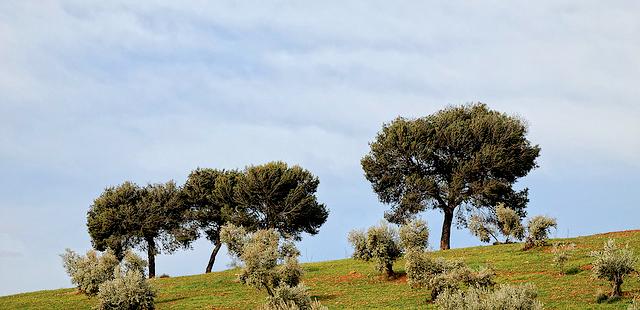Video: Spanish Olive Oil Farmers Struggling to Survive
Olive trees in Spain (photo: Mait Jüriado)
The new olives are barely beginning to show on grower Manel Lleisa’s 1,500 trees. Harvest isn’t until next winter. Lleisa says he should have a crew of workers here now, pruning. But he can’t afford it.
“Our biggest problem is the cost of labor,” Lleisa said. “The more mechanized your operation is the better, to reduce costs. But still we struggle. We’re down to just two employees. We used to have up to 10 during off time to prune trees.”
It’s not that hiring more workers would cut into Lleisa’s profits. There are no profits, he says. It costs Lleisa about $3 to make one liter of oil. But the handful of olive oil middlemen — the wholesalers — pay just $2.50. With every liter, he loses $0.50.
“I don’t want to get rich, I just want to survive,” Lleisa said. And if it costs me $3 or $3.50 to produce, the price should be $4. “In this way we could all get by. Right now the situation is abysmal. The consumer wants cheap products, and that’s what we’re forced to give them.”
Olive oil prices are in the gutter, which is good for consumers today. But olive growers like Lleisa say they’re being squeezed out of business.
Spain is the world’s largest olive oil producer, much of it going to the US. And farmers there say if they’re forced to abandon their orchards it will be an economic and environmental disaster.
At a supermarket in Barcelona called Caprabo, olive oil is dirt cheap, $2.50 a liter. Spaniards use olive oil in just about everything, from dressing salads to frying fish. Stores use it as a so-called “hook product,” a cheap staple that draws consumers in, so that they buy other stuff too.
A middle aged shopper named Maria Pilar Fernandez said she knows that olive growers are suffering. She said it’s always the wholesalers who make the money.
Spain’s main olive oil wholesalers and supermarkets either declined or didn’t respond to interview requests.
Stanka Becheva is with Friends of the Earth, an environmental group that defends small-scale farming. She said the dynamic in Spain’s olive oil market isn’t unique in Europe.
“The whole food chain is mostly controlled by few processors,” Becheva said. “They are setting the prices. We have in Europe around 30 million farmers and only a few processors and retailers negotiating the prices. It is not a monopoly but there are only a few of them who can set the prices, and that’s a problem.”
Becheva said Europe needs to change its agriculture policy, to promote local processing and selling. Such efforts exist, via cooperatives, like the one in Tortosa.
In this co-op’s supermarket, farmers like Lleisa can sell their olive oil and actually earn a little. Their market: people who consciously support local growers.
“They bring me the oil, and I sell it here at the co-op for $4 a liter,” said Josep Estrada, the co-op’s director. “But that’s only 10 to 15 percent of the production. The rest I have to sell in bulk to the wholesalers.”
Estrada said earnings from the co-op only cover the organization’s administrative costs, and nothing more. He says the wholesalers and supermarkets err by thinking only of the consumer.
“The producer, the farmer, we matter nothing to them, until our whole industry dies altogether. And if that happens they’ll just get their olive oil from Latin America, South Africa, or India, because they produce cheaper,” Estrada said.
Out in Manel Lleisa’s olive orchard, the farmer pointed toward the Spanish countryside. He said it’s not just millions of jobs that are at stake.
“Just look around at the fields where they’re not working the land anymore,” he said. “The grass is all grown up. Here in the summer it is very hot and dry. 100 degrees and not a drop of rain. If this brush catches fire it’ll reach all the way to Tortosa, consume this entire valley. And you’ll lose the entire sector.”
And here you can’t do anything else but grow olives, he said. It’s the only tree that can withstand the climate.
